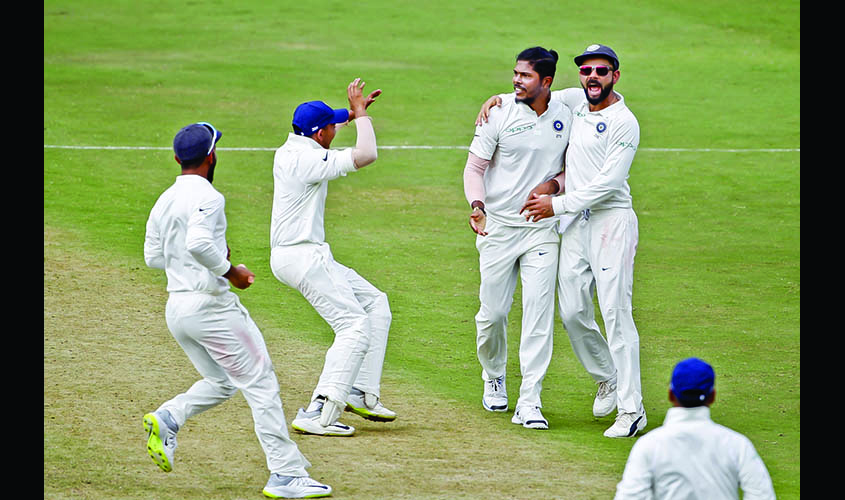The Australian PM introduced me to Bradman. I was surprised to note that he was only an inch taller than me.
Each night I keep awake till 11.30 p.m. to watch the Indian Premier League (IPL) cricket matches being played at Dubai, Abu Dhabi and Sharjah. Till oil was discovered in the late 1960s in the Persian Gulf region, the three places named above were dusty little villages. The entire Persian Gulf and its towns were ruled by Britain. Till the Viceroyalty of Lord Curzon, 1899-1905, these three, Oman and Kuwait were ruled from London.
In 1969, I accidentally stopped at Bahrain for a few hours. It reminded me of a remote village in the Thar desert of Western Rajasthan. Today these cities in the Gulf compare favourably with cities in the West. Their rulers are immensely rich. The lakhs of Indians, Pakistanis, Bangladeshis, Sri Lankans and Philippinos who work in the Gulf have also become rich. However, they remain second class citizens and can never become nationals of these Arab states.
On account of Covid, the IPL was shifted from India to these three Gulf states. The cricket grounds and pavilions are superbly maintained. Under normal circumstances the stands would be overcrowded with enthusiastic cricket fans. Now only five thousand are permitted entry. Covid is the problem.
The final of the IPL is scheduled to be played on 15 October. Four out of eight teams have qualified. Delhi Capitals, Chennai Super Kings, Royal Challengers Bangalore and Kolkata Knight Riders. I am putting my money on Delhi Capitals. Initially as a Rajasthani, I backed Rajasthan Royals, but Samson’s captainship was most disappointing.
Broadly speaking, British rule in India did more harm than good. The worst legacy is the colonisation of the minds of most of the English speaking Indians. The good is all too obvious. Parliamentary democracy, independent judiciary and if I am not mistaken it invented the word India. India is the only country in the world after which an ocean is named.
Cricket is an entirely British legacy. It was first played in England in the mid-18th century. The net spread to Australia, New Zealand and South Africa. India played its first test in 1932 in England. After 1947, Pakistan joined the MCC and became a first-class team. Things are not so rosy now. Ramiz Raza, chairman of the Pakistan Cricket Board said very recently that it was “Indian money in a way that was keeping the PCB afloat”. He told the Senate Standing Committee that the “Indian government can trigger a collapse of the PCB if it were so inclined”.
The IPL is a very wealthy sports outfit. Second only to American football. Players, umpires, coaches for batting, bowling, fielding, medical staff, TV channels—all make vast amounts of money. The players’ training is more than rigorous. Unless one is hundred per cent mentally, physically fit and psychologically sound he cannot make it to the test team.
The IPL, apart from being a money churning “machine”, provides opportunity to talented, up and coming young cricketers.
Only the other day one saw Ishan Kishan and Suryakumar Yadav miraculously scoring 82 and 84 in less than forty balls. Both are Test material. Two others are already in the Indian Test team, Rishabh Pant and Shreyas Iyer.
The phrase, “this is not cricket”, is no longer used. It had a restraining influence. It was at one time in use beyond cricket.
Don Bradman is the greatest player the game has produced. I never watched him play. I did meet him briefly in Sydney in 1989. I had gone to Canberra to deliver Prime Minister Rajiv Gandhi’s letter to Prime Minister Robert Hawke. I had driven by car from Sydney. All Australian airlines were on strike.
The thought of driving back to Sydney was not pleasing. I accidentally came to know that Prime Minister Hawke was flying to Sydney to attend the annual dinner in honour of Don Bradman. He was good enough to offer me a place in his plane. Bradman was not in the lobby. He and his wife and former England cricketer Colin Cowdry were in the VIP waiting room.
The Prime Minister introduced me to Bradman. I was surprised to note that he was only an inch taller than me. His accent was not Australian. We exchanged a few words. “I met another minister from India some months back. I forget his name.” It was Madhavrao Scindia.
The PM asked me to stay for dinner, but I excused myself.
I shall end with an Amarnath story. His cricket patron had been my wife’s grandfather Maharaja Bhupender Singh of Patiala. Amarnath was his ADC. He was allowed to play Test cricket.
In 1985, I was Minister of State for Steel. My private secretary informed me that Amarnath was waiting in his room. He wanted to see me. “Send him in.” I got up to greet one of India’s greatest cricketers. He knew my Patiala connection. “Kanwar sahib, I have come to ask for a favour. My third son is without a job…” I sent for the Secretary of the Ministry. “Can we find a Rs 5,000 a month job for Mr Amarnath’s son?” “Yes, Sir, we can.” The son got the job.

